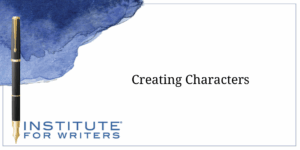
Creating Characters
Character development is an interesting part of writing but may be among the most time consuming and significant in your story.
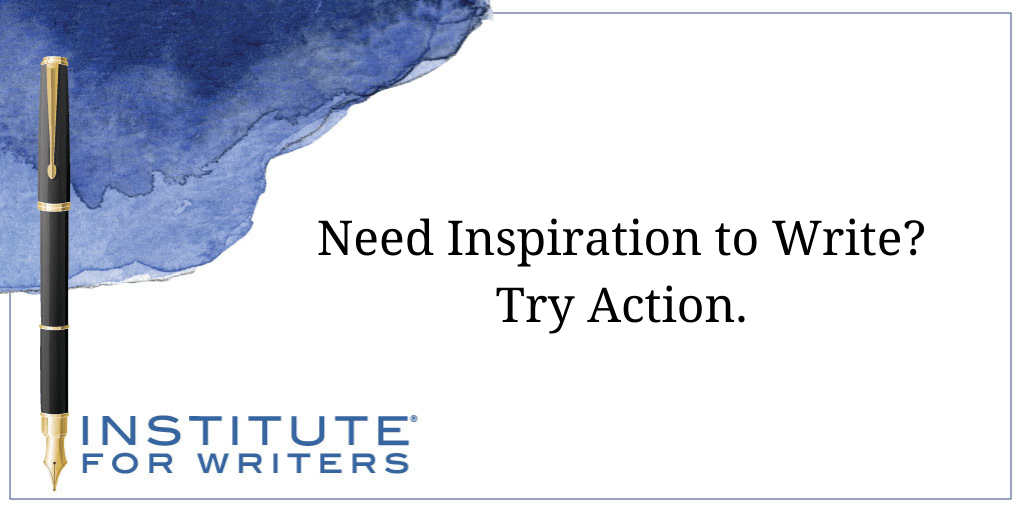
As another year unfolds, you have probably set writing goals you hope to achieve. For most writers, that means writing regularly and completing one or more projects. Yet, sometimes when you start to write, the words don’t come, or they don’t come easily. There is now inspiration to write. “I meant to write today,” you might say, “but I just wasn’t inspired.” This state of mind could reflect a lack of ideas or a stumbling block in your current project, among other things. Whatever the cause, have you wondered how other writers keep producing, year after year? Do they wait until they feel “inspired”?
Some writers, especially steady producers, have found that this process works in reverse—that the act of writing itself leads to inspiration to write. While they treasure those times when ideas and sentences flow with ease, they make the effort to write even when they don’t feel particularly inspired. Author Marion Dane Bauer once put it this way: “… I can write or I can sit around and think why I can’t write, but it is quite impossible to do both at the same time.”
We can see how this principle applies to other endeavors. People who resolve to exercise daily don’t always feel “inspired” to do so, but if they persevere, then exercising becomes a habit. The benefits of increased energy, strength, and fitness can generate more motivation, as well as pride in reaching a goal. Similarly, the act of writing tends to generate creative energy and feelings of satisfaction as we use our writing “muscles” and create sentences, paragraphs, and pages. The writing habit also tends to build confidence that we can do it again tomorrow.
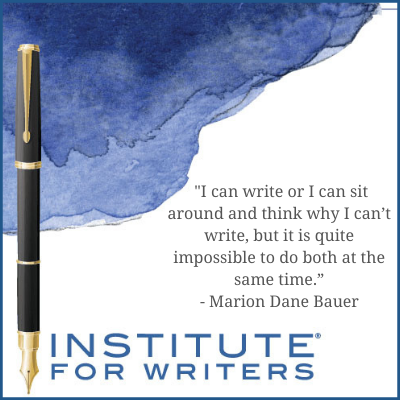
Still other writers “play” with their writing and explore different angles. One says, “I’ll rewrite a scene from a different viewpoint, or I’ll pretend to email back and forth with one of my characters.” An author who just finished her first book found it easier to write her chapters out of order during the first draft: “At times, I felt more ready to write about an event that would come later. I knew I could put everything together, in the right order, during the revisions.” Still other writers write about what’s outside their window, a conversation they overheard recently, or a holiday celebration. Like “warm-up” exercises, this kind of writing can help them get back to their work-in-progress.
Some writers are inspired by prompts—words, sentences, or visuals designed to spark ideas and suggest opening scenes. After reading or hearing a prompt, the writer develops one or more paragraphs. This prompt takes the form of a sentence: Opening the door, Lacey reared backwards in disbelief. Here’s one with three words: photograph, bus, seashell. An image can also serve as a prompt. Picture a man staring intently into the window of a second-hand store. What would you write?
Writing courses and workshops often include prompts to help students think creatively and develop new material. Prompts can be fun and stimulating. Again, the idea is to write without worrying about the outcome, yet these writings may lead to better skills and new projects. One writer says, “I’ve enjoyed spending an hour each week just for the fun of creating and actually finished several ‘prompt’ stories to submit to magazines and contests.”
Journaling can be useful anytime, but especially when a writer isn’t sure what to write next. You can journal most anyplace, with only a pen and paper. Write what you are thinking, feeling, and doing. Write about your childhood, dreams for the future, pet peeves, joys, and sorrows. Draw pictures, try poetry. Don’t judge the results—just explore and express yourself. Some writers find that journaling helps them recognize their authentic voice as a writer, and it often inspires other writings. One author said, “Looking through old journals, I see all kinds of things to write about and more ideas than I have time to develop.”
Are you ready to write when inspiration comes? Maybe you need to improve specific writing skills to move forward. We are more likely to get “stuck” and feel uninspired if we don’t know how to develop characters, use conflict effectively, write realistic dialogue, or organize our nonfiction. You can address those things by studying your craft, enrolling in a good writing course, and/or working with professionals who provide feedback and suggestions. I see this in action as my students learn the techniques they need to complete their writing projects. When inspiration to write comes, we want the writing tools to make the most of it.
Also consider which writing projects suit you best. When you care about your material, you will likely look forward to your writing sessions. As one author says, “I feel inspired when I’m excited by what I’m writing and want to share it with others.” Choosing projects that truly interest you can make it easier to stay inspired from start to finish.
So, keep writing. Polish your skills. Try writing prompts to stimulate creativity. Journal. Write, write, write, and let inspiration follow.
Victoria Sherrow has published short stories, articles, poetry, and books (fiction and nonfiction) for preschoolers through adults. She especially enjoys writing about courageous people who overcome adversity and improve the lives of others. Her books have been honored by the American Library Association, Parents Choice Gold Award, National Association for the Advancement of Science, and NYPL Best Books for the Teenage, among others. Victoria has taught at The Institute of Children’s Literature for more than 25 years and is inspired watching her students learn and grow as writers.

Character development is an interesting part of writing but may be among the most time consuming and significant in your story.
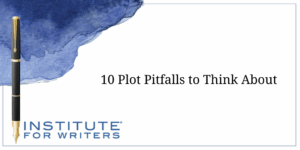
Plot can be tricky, and, as a writer, you need to be aware of what makes or breaks plot. Take a look at 10 different things to avoid in your own writing.
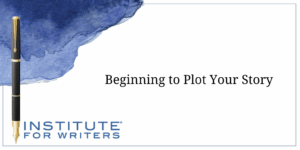
Plot is more than just the chain of events within a story. There are so many elements to plot to consider when writing. Let’s dive into those elements.
1000 N. West Street #1200, Wilmington, DE 19801
© 2024 Direct Learning Systems, Inc. All rights reserved.
1000 N. West Street #1200, Wilmington, DE 19801
© 2024 Direct Learning Systems, Inc. All rights reserved.
1000 N. West Street #1200, Wilmington, DE 19801
© 2024 Direct Learning Systems, Inc. All rights reserved.
1000 N. West Street #1200, Wilmington, DE 19801
© 2025 Direct Learning Systems, Inc. All rights reserved.
1000 N. West Street #1200, Wilmington, DE 19801
©2025 Direct Learning Systems, Inc. All rights reserved. Privacy Policy.
4 Comments